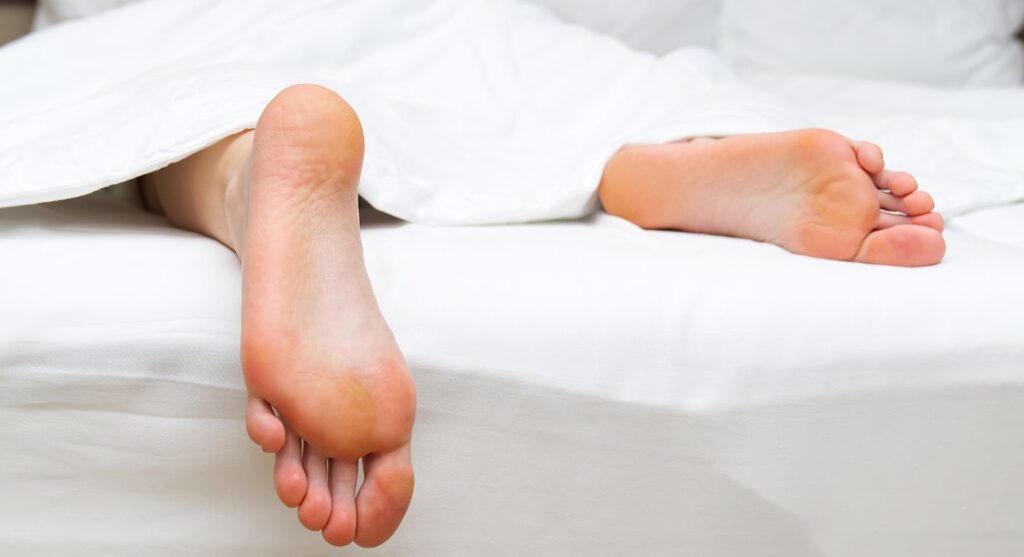Free delivery on all orders over £45
Free delivery on all orders over £45

Medically reviewed by
RLS is a condition that causes unpleasant sensations, including itching and burning in the feet and lower legs. People with RLS often report an urge to move to eliminate the feeling. If it sounds uncomfortable… That’s because it is!
And the condition isn’t so rare, either. According to NICE, the UK’s National Institute for Health and Care Excellence, the prevalence of RLS in the UK, US, and Europe is between 5 and 10 percent of the population.
RLS is well known to most commonly occur at night, interfering with sleep time and quality. This can result in daytime sleepiness and overall fatigue and can be damaging to your health.
So, what can be done about RLS? Should we grin and bear it? Or can magnesium help?
This article will cover everything you need to know about magnesium for restless leg syndrome, including
…And more! Let’s take a look.
Magnesium is a calming mineral. Magnesium is regularly associated with RLS, from helping prepare you for sleep, lowering brain temperature, and helping you “switch off” to relaxing the nerves in jumpy muscles.
Magnesium blocks the production of calcium, which is known to make muscles contract and “activate” nerves. So, if someone has a magnesium deficiency, their body isn’t regulating its calcium production, causing muscles to contract and nerves to become overactive.
Read more: Magnesium for muscle pain
While more research is needed, preliminary evidence supports the use of magnesium in managing RLS.
One study conducted back in 1998 observed ten participants, all of whom suffered from moderate RLS and periodic limb movements during sleep (PLMS). The participants reported better sleep after consuming magnesium supplements. However, the study results are difficult to extrapolate to a wider population due to its use of a very limited sample of people.
A review conducted by the Mayo Clinic also indicates that combining magnesium with intravenous iron can be an effective treatment for RLS. The literature also suggests that avoidance of caffeine, alcohol and nicotine may help improve RLS and that other prescribed medications may be a trigger.
Finally, research from 2006 supports the use of magnesium for RLS suffered in pregnancy. However, this study followed one case study with one participant. While RLS symptoms were entirely abated after magnesium treatment in this case, it is difficult to apply these findings to a wider population or even generalise across pregnant people.
Read more: Magnesium in pregnancy

So what magnesium is best for restless leg syndrome? While research on magnesium for restless leg syndrome offers positive indications, it is – at best – limited. Because of this, it’s impossible to say which form of magnesium is best for restless legs.
However, if RLS results from (or is exacerbated by) a magnesium deficiency, there are a few forms of magnesium with superior absorbability.
Magnesium citrate is – as the name suggests – a compound of magnesium and citrate. Citrate is an organic compound or salt found naturally in citrus fruits.
What’s so great about magnesium citrate?
Firstly, it’s the most researched form of magnesium. This means there are lots of studies backing up its efficacy and safety. Secondly, as previously mentioned, this compound is highly bioavailable, meaning that when consuming magnesium citrate, you can be sure that the active ingredients are making their way into your body.
And magnesium citrate has the Evopure seal of approval- it’s one of the two forms of magnesium in our (Reader’s Digest number one rated!) magnesium sleep blend.
Magnesium L-threonate – the second form of magnesium in our magnesium blend – is also highly absorbable and bioavailable, and thus also a great option for anyone looking to try magnesium for restless leg syndrome.
Magnesium L-threonate is made by mixing threonic acid (derived from the metabolic breakdown of vitamin C) with magnesium.
As RLS has been associated with an imbalance in dopamine levels in the brain, magnesium L -threonate – with its capacity to cross the blood-brain barrier and improve neurological health – may be a good option for those with RLS.
10% off on your first order
Complete this one-minute quiz and find the right products for you.
Is there an optimal way to use magnesium for restless legs? Does it matter if you use capsules for RLS, or are creams or magnesium sprays a better option? Let’s take a look at the possibilities.
Magnesium spray can be a good option for quick relief, including from RLS. Always apply magnesium spray to clean skin after a bath or shower. Using magnesium spray as and when required can offer quick relief for aches and pains.
The jury’s still out on transdermal magnesium (absorbable through the skin), with some anecdotal evidence touting the benefits of magnesium cream.
But while researchers are divided – with some believing that cream may not be as effective as replenishing magnesium levels via powder or capsules – a number of studies do support the use of transdermal magnesium in replenishing cellular magnesium levels. As with magnesium spray, use cream on the affected areas (in this case, legs) at regular intervals.
While magnesium powder won’t instantly target restless legs in the same way that magnesium spray or cream will, powder is a highly effective way of increasing your magnesium levels and thus combating any deficiency.
Always consume magnesium daily, and with powder, ensure you adhere to the packaging guidelines to properly dilute and consume the optimal amount. For example, magnesium sleep blend powder requires you to dissolve 5g (or one scoop) of magnesium in your drink (hot or cold) before bed.
As with powder, magnesium capsules can support the correction of a magnesium deficiency – as opposed to specifically targeting restless legs.
However, if your RLS is caused or worsened by a magnesium deficiency, this certainly isn’t the worst option. Always choose a highly bioavailable form of magnesium – such as magnesium citrate – if consumed in capsule form to ensure the most amount of magnesium makes its way into your body.

Restless Leg Syndrome is often worse at night. Researchers think this is due to the connection between RLS and dopamine. Muscle spasms and involuntary movements are related to the amount of dopamine in the brain. And, as dopamine levels in our bodies drop towards the end of the day, the symptoms of RLS worsen.
As such, just as when taking magnesium to improve sleep, you should take magnesium around half an hour before you sleep for RLS. Taking magnesium with an evening meal is another good option.
Read more: Best time to take magnesium
There’s no specific ideal magnesium dose for restless legs. There are baseline recommended doses for supplementation, though: between 310-320 mg for women and 400-420 mg for men. The correct dose for you will also depend on the severity of magnesium deficiency and age.
Always stick to dosage guidelines on product packaging, and consult a medical professional.
According to the NHS, nobody should take more than 400mg of magnesium daily. Do note that taking excessive doses of magnesium (ten or so times the recommended dose) can seriously harm you and may cause hypermagnesemia.
The relationship between magnesium deficiency and restless leg syndrome isn’t confirmed. Research varies in quality and needs more quantity, making it difficult to extrapolate findings to wider populations and come to steadfast conclusions. Researchers are still learning about RLS, and investigations into the role of dopamine in the condition are ongoing.
However, limited scientific evidence and a heap of anecdotal evidence point to people experiencing relief from RLS after taking magnesium.
As such, so long as you have the approval of a medical professional (to ensure magnesium won’t interact with any other medication you might be taking), magnesium could be a low-cost, generally safe option to help relieve the discomfort of RLS.
Sign up for the Evopure newsletter:
This product is not for use by or sale to persons under the age of 18. It should not be used if you are pregnant or nursing. Consult with a physician before use if you have a serious medical condition or use prescription medications. A Doctor’s advice should be sought before using this and any supplemental dietary product. This product is not intended to diagnose, treat, cure or prevent any disease.
© Evopure Ltd. All rights reserved Terms & Conditions Cookie Policy Sitemap